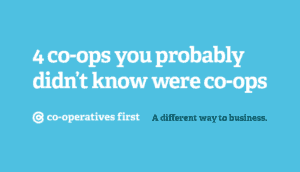As costs rise, Canadians are more frequently struggling to make ends meet. Growing housing costs, higher prices at the grocery store and gas pump, increased utility bills — it’s getting harder to cover the basics.
Governments and big businesses haven’t provided solutions to give our pocketbooks a break — but we can create our own solutions. Co-ops are a way for people to work together to create the businesses that help us meet our needs, affordably.
As times change, and prices rise, Canada needs more co-ops to keep the cost of living within reach. Here are three ways you can address affordability by creating a co-operative.
Childcare Co-operatives
Childcare is a major expense for Canadian families. In Alberta, families can pay up to $10,330 in childcare fees per child each year. When parents don’t have access to childcare they can afford, it affects their ability to work, support their families, and contribute to the economy.
People can solve this problem by creating co-operative childcare centres. These co-ops are not-for-profit, community-owned, and licensed facilities, which allows them to apply to the federal government’s $10-a-day program. And what’s great about childcare co-ops is that community leaders can get together to start one, taking the pressure off already-busy parents to do it themselves.
Co-operatives like Saskatoon’s Beansprouts Childcare Co-op, or the Maple Creek Childcare Co-operative, ensure parents can access affordable, reliable care. And any community can create a childcare co-op! In fact, the more groups across Canada who can create their own childcare spaces, the better off everyone will be.
Co-operatives First recently received funding from PrairiesCan to support the creation of more childcare co-ops. We help groups navigate the process of planning their co-ops, accessing the government funds available, and incorporating the business so it can get up and running. If you’re ready to bring affordable, accessible childcare to your community, get in touch with us.
Housing Co-operatives
The average price for a home in Canada has ballooned to $716,000 (an over $4,000 monthly mortgage payment!) and the average rent is $2,149/mo. Considering the median household income is $6,083 per month, we’ve got a problem. The number of Canadians who spend 30% or more of their income on housing is increasing — nearly one-fifth of renters spend more than half of their household income on rent. A lack of investment in government-led affordable housing means private landlords who want to make a profit fill the gap. But there are alternatives.
The Co-operative Housing Federation of Canada says that in Canada’s major cities, members of housing co-ops pay $400-$500 less per month than other rentals. Housing co-ops are owned and operated by their tenant-members, who share in the cost and responsibility of maintaining the property. As a result, there’s no incentive to raise rents beyond what’s needed to cover the shared expenses and repairs. No one’s looking to make a profit – the goal is just to have a good, stable, affordable place to live.
Just like childcare co-ops, ordinary people like you and I need to get things started to create the co-operative solutions we need. If this is an alternative you’d like to explore, check out our resources for starting a housing co-op.
Grocery and Gas Co-operatives
It’s hard to avoid the impacts of inflation at the grocery store. Price increases are fuelled by Canada’s grocery giants like Loblaws and Metro which control most of the retail market and are looking to turn a profit. In Western Canada, we’ve always had a solution to avoid getting ripped off at the checkout or the gas pump. The Co-operative Retailing System consists of more than 160 locally owned co-ops that serve over 2 million members.
While co-operative grocers aren’t insulated from the effects of supply chain issues and inflation, they’re an outlier in the grocery business. They give their members (customers) a say in how the business works, and they reinvest their profits in the communities they serve. While profits from Loblaws and Sobeys are shared among fancy-pants investors, your local Co-op directs those profits back to you and me through patronage dividends, and investments in community projects.
What can you do?
Co-operatives aren’t the only solution to Canada’s affordability crisis, but they are a step in the right direction. Supporting your local co-op or starting a co-op to address an unmet need is one way you can make a difference in your community and make life a little more affordable. And you don’t have to do this alone. Our team of experts is ready to guide you through the process of starting a co-op with advice and resources.

 Written by
Written by 


